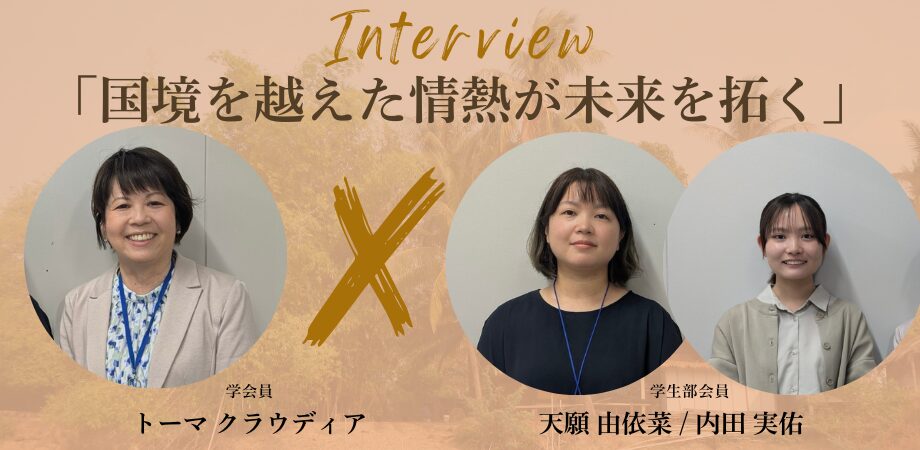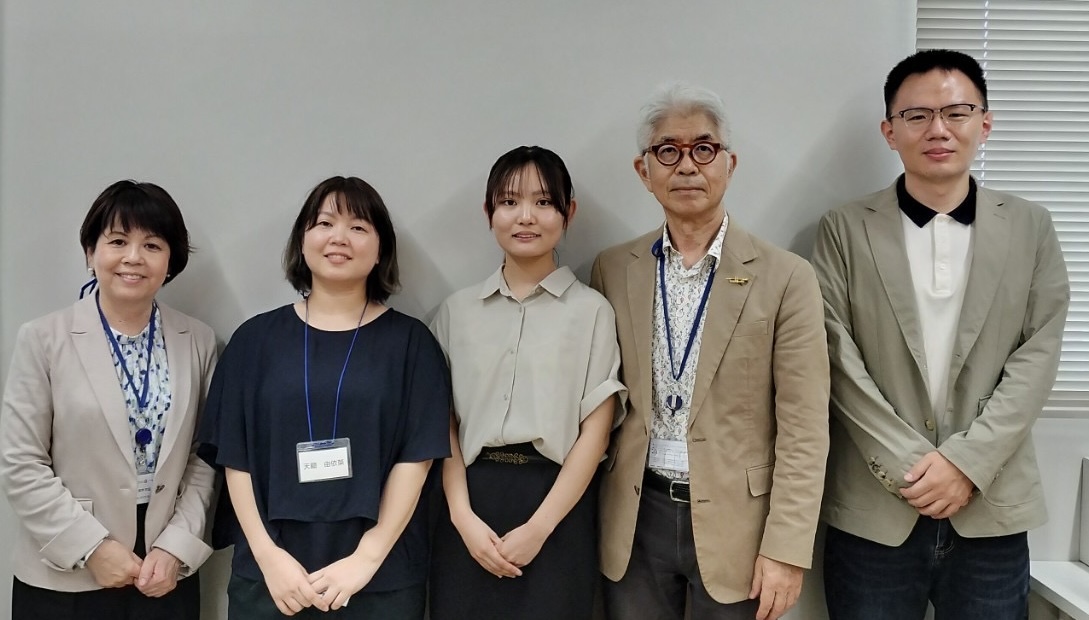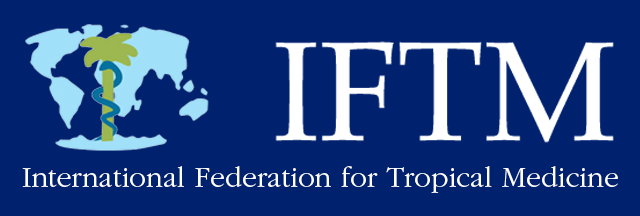
Witnessing a cholera pandemic.
Tengan:
Dr. Toma, you graduated from the University of Buenos Aires and came to Okinawa from Argentina. Could you tell us what led you to your current work and how that journey unfolded?
Toma:
My parents are originally from Okinawa, so I’m a second-generation Japanese Argentine. After the war, they migrated to South America, and I was born and raised there. I studied biochemistry at the University of Buenos Aires. Rather than just memorizing facts, I wanted to pursue the unknown, which is why I chose biochemistry instead of medicine. The biochemistry faculty also covered many medically relevant topics, so in my sixth year, I studied infectious diseases, bacteriology, and immunology—subjects that directly relate to the research I’m doing now.
In my faculty, we received a clinical laboratory technician qualification upon graduation, but I felt I wasn’t suited for a job where I’d be doing the same thing every day.
After graduating, I went on a trip with friends to Chile. Around that time—around 1992—cholera began to spread throughout South America. Until then, cholera hadn’t existed there, and since I had just graduated, I honestly didn’t even know what cholera was. It spread rapidly. We had planned to travel from Chile to Peru, where the outbreak began.
Tengan:
I didn’t know that.
Toma:
In the 1990s, cholera caused a massive outbreak in South America, with many deaths. The region lacked sufficient knowledge about the disease and didn’t know how to respond, which led to widespread panic. Seeing firsthand how an infectious disease spreads made me gradually want to work in disease prevention. While I now know how challenging that is, back then I casually said, “I want to develop a vaccine.”
These days we can create RNA vaccines quickly, but back then, even after 50 years, vaccine development was incredibly difficult. Developing vaccines requires strong basic research, which made me increasingly interested in research. That’s how I came to Okinawa as a government-sponsored international student for nine months. Japan had advanced research on Vibrio cholerae, so I studied cholera here. Have you heard of Professor Masaaki Iwanaga from the University of the Ryukyus?
Tengan:
No, is he a bacteriologist?
Toma:
Yes. He was the first professor of bacteriology at the University of the Ryukyus and the founder of the university’s Tropical Medicine Society. He was also Professor Yamashiro’s mentor. I studied cholera under Dr. Iwanaga at the University of the Ryukyus and completed my doctoral program in bacteriology. After that, I became an assistant, and now I’m an associate professor. I’ve been in this lab for nearly 30 years.
After my nine-month scholarship period in Okinawa, I returned to Argentina and joined the National Institute of Microbiology. Even though I had only studied cholera for nine months, I was treated like a cholera expert. Before the massive outbreak in the 1990s, cholera had never really occurred in Argentina. No one knew how to culture the bacteria or detect its toxins.
But without that knowledge, you can’t develop a vaccine. I realized I needed to study more, and I’ve continued with that mindset ever since. Sometimes, one experience in your youth can completely change your life. For me, it was that I happened to graduate just as cholera started spreading across South America. Without that, I’m not sure I would have found the same motivation.
Uchida:
If that outbreak hadn’t happened, what kind of life do you think you would have led?
Toma:
If I had to choose between treating illness or preventing it, I’ve always wanted to focus on prevention. So if there had been no cholera outbreak, I think I would have chosen immunology. I had a strong desire to keep studying and contribute to prevention, so I might have become an immunologist.
Turning big dreams into something concrete depends on the people you meet. Even if you have a dream, it’s hard when you’re young to know exactly what you want to do within that. I think that as you graduate, go to different places, and have different experiences, you eventually find “this is it.” In my case, that big dream gradually became more specific and narrow, eventually leading me into the molecular world.
Steadily doing what I can.
Tengan:
What kind of work are you currently doing at the University of the Ryukyus? Also, what led you to your current research theme?
Toma:
After completing my doctoral course, I initially worked on cholera, but I’ve been researching leptospirosis for the past 17 years. While I was a research student at the University of the Ryukyus, I began thinking that since I was working in a Japanese institution, I should focus on infectious diseases that are actually problematic in Japan. Have you heard of E. coli O157? There was a massive outbreak in Sakai City, infecting around 10,000 people and even resulting in deaths. It was the largest E. coli O157 outbreak in the world at the time. That incident made me want to study enterohemorrhagic E. coli.
Uchida:
So it wasn’t O157 that you ended up researching?
Toma:
I was certainly drawn to the unknown, but as you grow older, you begin to realize what you’re capable of and what you’re not. At the time, O157 was receiving a lot of global attention, so I deliberately chose to research a different type of E. coli. After continuing research in Okinawa, I became more interested in locally rooted issues, and that’s how I got into leptospirosis. More than half of all leptospirosis cases in Japan occur in Okinawa, yet diagnostic methods and the understanding of its pathogenic mechanisms were insufficient. Also, very few researchers were working in the field, which led me to take it on—and here I am 17 years later.
My research pace is extremely slow. I value balancing work and family, and I’ve been raising three children while continuing my research. Bacteria like E. coli or Vibrio cholerae multiply quickly, so if you can’t keep up, you fall behind. But leptospira takes 1–2 weeks to culture, which makes it easier to progress at a slower pace. Even if I step away because one of my kids has a fever, the bacteria won’t die. In a way, leptospira fits my lifestyle, and because there’s still so much we don’t know about it, I’ve been able to explore various research themes.
Tengan:
I’ve lived in Okinawa all my life and used to play in rivers up north, but I hadn’t even heard of leptospirosis until recently.
Toma:
If you play in rivers and get a mild fever afterward, you probably wouldn’t suspect leptospirosis. In healthy individuals, the symptoms are often mild.
Tengan:
How is it diagnosed nowadays?
Toma:
There are diagnostic methods using blood or urine, but diagnosis isn’t always immediate. That’s why medical interviews are very important. If you just have a mild fever, most people won’t go to the hospital. They’ll probably wait and see. Maybe if you have a high fever for 3–4 days, you’ll go, but if it goes down quickly, you might just ignore it. Looking back, though, it could have been leptospirosis.
Uchida:
Can it become severe?
Toma:
In some cases—especially in older people—fever doesn’t subside, and it can lead to kidney failure or even a sudden deterioration as the bacteria spread through the body. Leptospira bacteria are transmitted through water contaminated with the urine of infected animals. You can get infected by swimming in such rivers or drinking contaminated water—it can even enter through the skin. I’ve done various studies on leptospira, but right now I’m researching how the bacteria penetrate human skin cells and move through the gaps between them.
Tengan:
What do you think is the significance of Japan contributing to tropical medicine?
Toma:
Well, I’m not Japanese, so I’m not sure I can speak for the country… But speaking from my position, I think I became interested in infectious diseases because I personally saw what happens during a cholera outbreak. I saw thousands of people fall ill and die. People went into panic—just like with the recent COVID-19 pandemic.
I think Japan’s involvement in tropical medicine stems partly from its long-standing role as a developed country with systems like JICA and other cooperative international projects. And another reason—please correct me if I’m wrong—is perhaps because Japan is an island nation, there’s a strong desire to go abroad and broaden one’s perspective.
Uchida:
I think that’s true.
Toma:
I see that mindset in students too. I was born in South America, so “overseas” was always part of my everyday life. Among my classmates were people from Spain, Europe, and various other countries—so I grew up immersed in cultural diversity. But I think Japanese people are genuinely curious about other cultures. Maybe that’s why they actively seek to learn about diseases not found in Japan and try to broaden their perspectives.
Going to tropical regions and having experiences you can’t get in Japan—meeting people, learning firsthand—those are very important experiences. It’s not just about academic learning. You also get to interact with people of different races and perspectives. And once you come back to Japan, your entire outlook can change. On that note, why are you interested in tropical medicine?
Uchida:
I’m interested in parasites and protozoa. They change depending on the environment, right? I’m fascinated by how they evolved that way and how they detect environmental changes. That’s why I joined J-trops.*
*J-trops: Japanese Society of Tropical Medicine Student’s Branch
Toma:
That makes sense too. If the field you’re interested in doesn’t exist in Japan, you naturally have to go abroad. What about you, Tengan?
Tengan:
Like you mentioned earlier, I initially became interested in going abroad. While reading books and gathering information, I came across news of infectious diseases spreading in other regions. That’s when I started getting interested in tropical medicine and infectious diseases.
Toma:
Your generation experienced COVID-19, so I think your perspective might be a little different. Living in Japan, it’s hard to truly understand how infectious diseases can impact people’s lives and society. Before the pandemic, I think people in Japan took the absence of infectious disease for granted. But if you step outside of Japan, there are hundreds or even thousands of infected people.
Passing on to the next generation
Tengan:
What are your future goals, dreams, or things you’d like to pursue?
Toma:
I feel that many young people in Japan today don’t have dreams or aren’t sure yet what they want to do. That’s why I’d like to share my experiences with younger generations like you two, so that more young people can find a dream and act on it.
Speaking personally, in terms of research, my dream is to uncover the mechanisms of leptospirosis infection. But I know that I don’t have unlimited time left in my research career, so I realize there are limits to what I can do myself. That’s why I’ve started to focus on developing the next generation—welcoming as many people as possible into this lab and gradually passing on the baton of what I’ve been working toward.
It took me a lot of time and effort to acquire the research skills I have today. So I really want to pass those on to the next generation. I believe the goals I’m working toward won’t be achieved in just one generation—it’ll take many. But that’s how research is, right?
So while I want to leave behind the results of my own research, I also want to dedicate myself to training others. And not just in my own field—I hope more people will take an interest in infectious diseases and tropical medicine more broadly.
Uchida:
Do you have any advice for students who are interested in tropical medicine?
Toma:
I’m not sure I’m in a position to give advice, but I would say—go there. These days, it’s easy to get all kinds of information online, but I still think it’s important to actually visit the place. And if possible, stay for an extended period. What you see in 2 or 3 days is completely different from what you’ll experience over several weeks.
I know it can be difficult with school schedules and curriculum constraints, but by being on the ground, I think vague dreams and goals will gradually become clearer—“this is what I want to do.” When you’re there, you’ll meet a variety of people and be exposed to so many things, and I believe those experiences will bring out even more ideas and motivation within you. The key is to keep turning those into action.

From left to right: Dr. Toma Claudia, Yuina Tengan, Miyu Uchida, Dr. Tetsu Yamashiro, and Dr. Jun Xu.
Profile of Interview Participants
Dr. Claudia Toma
Associate Professor, Department of Bacteriology, Graduate School of Medicine, University of the Ryukyus. Originally from Argentina. Fluent in Spanish, Japanese, and English. Graduated in 1992 from the Faculty of Pharmacy and Biochemistry, University of Buenos Aires. Inspired to pursue research after witnessing a major cholera outbreak at the time of her graduation. In 1993, she became a researcher at the National Institute of Microbiology in Argentina. Since 1994, she has been engaged in research on cholera and leptospirosis at the Department of Bacteriology, Faculty of Medicine, University of the Ryukyus.
Yuina Tengan
Third-year medical student at the Faculty of Medicine, Shimane University. Originally from Okinawa. Became interested in infectious diseases after reading a novel in elementary school. Aims to contribute as a “glocal” clinician—active both locally and globally. Hobbies include traveling and swimming. Active in a rural medicine research group, the Aikido club, and an international exchange circle. Motto: “If something catches your attention, respond to it.”
Miyu Uchida
Second-year medical student at the Faculty of Medicine, Nagasaki University. Originally from Shizuoka Prefecture. Entered the Faculty of Agriculture at Tohoku University in 2022. During her studies, her academic interests shifted toward medicine. She withdrew in her second year and entered Nagasaki University’s Faculty of Medicine in 2024. Her fields of interest include neglected tropical diseases (NTDs), zoonotic diseases, ecosystems, and basic research.

